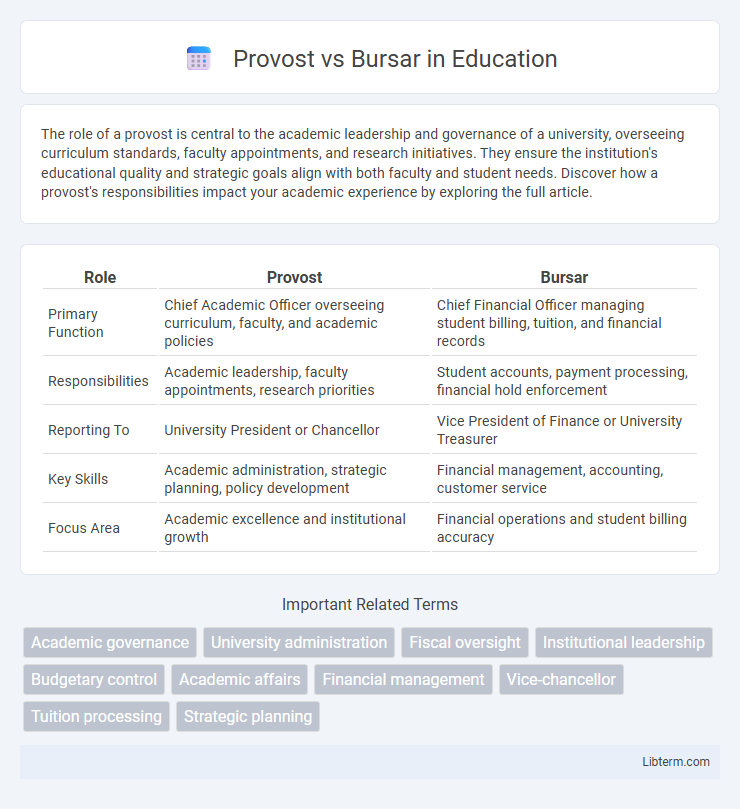The role of a provost is central to the academic leadership and governance of a university, overseeing curriculum standards, faculty appointments, and research initiatives. They ensure the institution's educational quality and strategic goals align with both faculty and student needs. Discover how a provost's responsibilities impact your academic experience by exploring the full article.
Table of Comparison
| Role | Provost | Bursar |
|---|---|---|
| Primary Function | Chief Academic Officer overseeing curriculum, faculty, and academic policies | Chief Financial Officer managing student billing, tuition, and financial records |
| Responsibilities | Academic leadership, faculty appointments, research priorities | Student accounts, payment processing, financial hold enforcement |
| Reporting To | University President or Chancellor | Vice President of Finance or University Treasurer |
| Key Skills | Academic administration, strategic planning, policy development | Financial management, accounting, customer service |
| Focus Area | Academic excellence and institutional growth | Financial operations and student billing accuracy |
Understanding the Roles: Provost vs Bursar
The Provost serves as the chief academic officer in a university, overseeing curriculum development, faculty appointments, and academic policies to ensure educational excellence. In contrast, the Bursar manages the institution's financial affairs, including student billing, tuition collection, and budget administration to maintain fiscal responsibility. Understanding the distinct responsibilities of Provost and Bursar is essential for grasping the administrative structure of higher education institutions.
Definition of Provost
The provost is the chief academic officer of a university, responsible for overseeing curriculum, faculty affairs, and academic policies to ensure educational excellence and strategic planning. In contrast, the bursar manages the institution's financial operations, including student billing, tuition collection, and budgeting. The provost plays a key role in shaping the academic vision and maintaining the standards of teaching and research within the university.
Definition of Bursar
The bursar is the financial administrator responsible for managing an institution's budget, student billing, tuition payments, and financial records. Unlike the provost, who oversees academic affairs and faculty matters, the bursar ensures accurate processing of fees, disbursement of refunds, and compliance with financial policies. Effective bursar management supports the institution's fiscal stability and student financial services.
Key Responsibilities of a Provost
The Provost serves as the chief academic officer responsible for overseeing faculty affairs, academic programs, and research initiatives, ensuring the institution's educational standards and policies align with its mission. Key responsibilities include managing curriculum development, faculty recruitment and evaluation, and fostering academic excellence and innovation across departments. The Provost collaborates with deans and department heads to allocate resources effectively and promote strategic planning in higher education institutions.
Key Responsibilities of a Bursar
The Bursar is primarily responsible for managing an institution's financial operations, including tuition billing, student accounts, and payment processing. This role also oversees budgeting, financial reporting, and coordinating with other departments to ensure accurate financial record-keeping. Unlike the Provost, who focuses on academic leadership, the Bursar ensures the institution's fiscal health and compliance with financial policies.
Organizational Position: Where Provosts and Bursars Fit
Provosts serve as the chief academic officers in universities, overseeing faculty, curriculum development, and academic policies, typically reporting directly to the university president or chancellor. Bursars manage financial operations related to student accounts, including tuition billing and payments, and usually report to the chief financial officer or business office director. The provost's role primarily influences academic strategy, while the bursar focuses on the administrative and financial aspects of student services within the organizational structure.
Academic Leadership: Role of the Provost
The provost serves as the chief academic officer responsible for overseeing academic policies, faculty affairs, and curriculum development within a university. This role emphasizes strategic planning, research initiatives, and maintaining academic standards to promote institutional excellence. In contrast, the bursar manages financial operations, including student billing and budget administration, with limited involvement in academic leadership.
Financial Management: Role of the Bursar
The Bursar plays a critical role in financial management within educational institutions, overseeing student billing, tuition fees, and payment processing to ensure accurate account handling. This office manages the disbursement of funds, collection of debts, and coordination of financial services related to student accounts. Unlike the Provost, whose focus is academic leadership, the Bursar specializes in operational finance, contributing to the institution's fiscal stability.
Collaboration Between Provosts and Bursars
Provosts and bursars collaborate closely to align academic priorities with financial management, ensuring resource allocation supports institutional goals. The provost provides strategic academic leadership while the bursar manages budgeting, tuition, and revenue collection, facilitating informed decisions through transparent financial reporting. Effective communication between these roles drives fiscal responsibility and academic excellence within universities.
Provost vs Bursar: Key Differences Explained
The Provost serves as the chief academic officer in a university, overseeing curriculum development, faculty affairs, and academic policies, ensuring educational quality and strategic planning. In contrast, the Bursar manages financial operations, including tuition billing, student accounts, and cash management, focusing on the institution's fiscal responsibilities. The core difference lies in the Provost's academic leadership versus the Bursar's financial stewardship within higher education administration.
Provost Infographic

 libterm.com
libterm.com